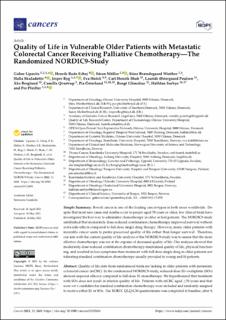Quality of life in vulnerable older patients with metastatic colorectal cancer receiving palliative chemotherapy—the randomized nordic9-study
Liposits, Gabor; Eshoj, Henrik; Möller, Sören; Winther, Stine Brændegaard; Skuladottir, Halla; Ryg, Jesper; Hofsli, Eva; Shah, Carl-Henrik; Poulsen, Laurids Østergaard; Berglund, Åke; Qvortrup, Camilla; Österlund, Pia; Glimelius, Bengt; Sorbye, Halfdan; Pfeiffer, Per
Peer reviewed, Journal article
Published version

Åpne
Permanent lenke
https://hdl.handle.net/11250/2765082Utgivelsesdato
2021Metadata
Vis full innførselSamlinger
- Institutt for klinisk og molekylær medisin [3459]
- Publikasjoner fra CRIStin - NTNU [37733]
- St. Olavs hospital [2482]
Sammendrag
Bowel cancer is one of the leading cancer-types in both sexes worldwide. Despite that most new cases and deaths occur in people aged 70 years or older, few clinical trials have investigated the best way to administer chemotherapy in older or frail patients. The NORDIC9-study established that moderately dose-reduced combination chemotherapy improved survival without extra side-effects compared to full dose single drug therapy. However, many older patients with incurable cancer seem to prefer preserved quality of life rather than longer survival. Therefore, our aim with the current quality of life analysis of the NORDIC9-study was to assess that the more effective chemotherapy was not at the expense of decreased quality of life. Our analyses showed that moderately dose-reduced combination chemotherapy-maintained quality of life, physical functioning, and resulted in less symptoms than treatment with full dose single drug in older patients not tolerating standard combination chemotherapy usually provided to young and fit patients.
